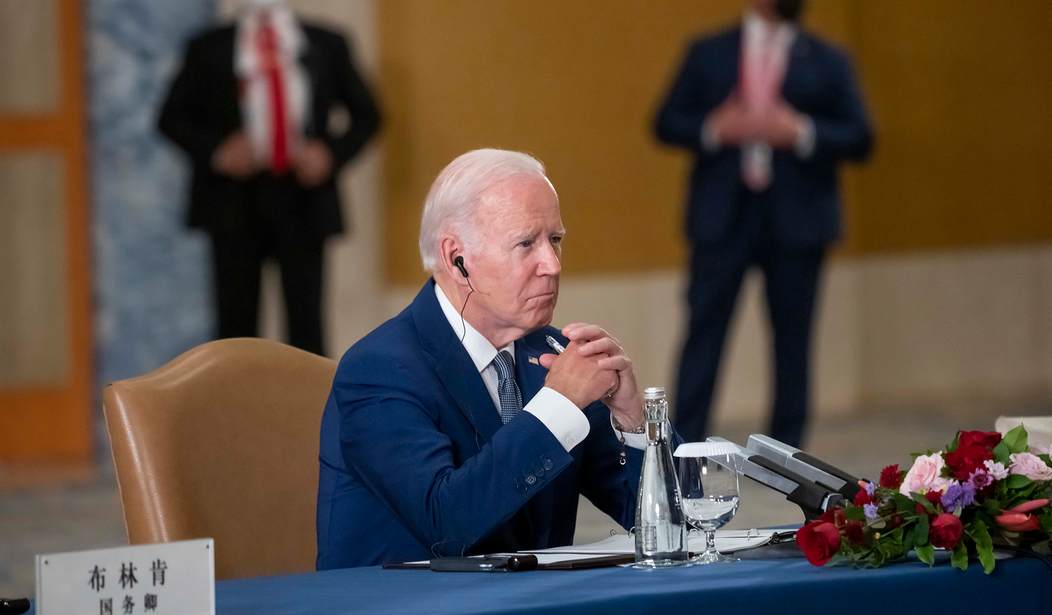President Biden convened the leaders of South Korea and Japan at Camp David on Friday for a trilateral meeting which resulted in the announcement of a new statement of principles between the nations regarding cooperation in the Indo-Pacific but there was one major name — China — missing from what the White House dubbed the "Camp David Principles."
"Today we made history," Biden said of the first standalone summit between the leaders of the U.S., Japan, and South Korea at a press conference following the principles' release — but the president also avoided mentioning China in his remarks.
The Camp David Principles were released by the White House under the names of President Biden, Prime Minister Kishida Fumio, and President Yoon Suk Yeol to "affirm a shared vision for our partnership as well as for the Indo-Pacific and beyond."
The leaders explain that their partnership is "based on a bedrock of shared values, mutual respect, and a unified commitment to advance the prosperity of our three countries, the region, and the globe," and state that they intend their partnership to be guided by a list of principles.
Take a look:
As Indo-Pacific nations, Japan, the Republic of Korea (ROK), and the United States will continue to advance a free and open Indo-Pacific based on a respect for international law, shared norms, and common values. We strongly oppose any unilateral attempts to change the status quo by force or coercion.
The purpose of our trilateral security cooperation is and will remain to promote and enhance peace and stability throughout the region.
Our commitment to the region includes our unwavering support for ASEAN centrality and unity and the ASEAN-led regional architecture. We are committed to partnering closely with ASEAN to advance implementation and mainstreaming of the ASEAN Outlook on the Indo-Pacific.
We are determined to work closely with Pacific Island countries and the Pacific Islands Forum as the region’s leading institution, consistent with the Pacific Way.
We stand united in our commitment to the complete denuclearization of the Democratic People’s Republic of Korea (DPRK) in accordance with relevant United Nations Security Council resolutions. We remain committed to dialogue with the DPRK with no preconditions. We seek to address human rights and humanitarian issues, including the immediate resolution of the issues of abductions, detainees, and unrepatriated prisoners of war. We support a unified Korean Peninsula that is free and at peace.
We reaffirm the importance of peace and stability across the Taiwan Strait as an indispensable element of security and prosperity in the international community. Recognizing that there is no change in our basic positions on Taiwan, we call for a peaceful resolution of cross-Strait issues.
As leading global economies, we seek continued opportunity and prosperity for our peoples, the region, and the globe through open and fair economic practices that promote financial stability as well as orderly and well-functioning financial markets.
Our technology cooperation will contribute to the vibrance and dynamism of the Indo-Pacific as we cooperate towards open, accessible, and secure technology approaches based on mutual confidence, trust, and respect for relevant international law and standards. We will seek to develop standard practices and norms between our countries and within international bodies to guide the development, use, and transfer of critical and emerging technologies.
Our countries are committed to cooperation to address climate change and will work together to provide leadership and solutions through relevant international institutions. We are committed to enhancing our development and humanitarian response cooperation to collectively overcome global issues and the root causes of insecurity.
We are unflinching in our commitment to uphold the principles of the UN Charter, particularly those relating to sovereignty, territorial integrity, the peaceful settlement of disputes, and the use of force. A threat to these principles anywhere undermines respect for them everywhere. As responsible state actors, we seek to promote the rule of law and to ensure regional and international security so all can flourish.
Our countries are dedicated to honoring our commitments to non-proliferation as parties to the Treaty on the Non-Proliferation of Nuclear Weapons. We reaffirm that achieving a world without nuclear weapons is a common goal for the international community, and we continue to make every effort to ensure that nuclear weapons are never used again.
Our countries are only as strong as our societies. We reaffirm our commitment to promoting the full and meaningful participation of women in our societies and to human rights and dignity for all.
We announce these shared principles at the start of our new chapter together, with the belief that they will continue to guide our trilateral partnership for years to come.
Above all, we recognize that we are stronger, and the Indo-Pacific is stronger, when Japan, the Republic of Korea, and the United States stand as one.
Recommended
Nowhere in these principles is there any mention of China, the CCP, Xi Jinping, or the escalating hostilities against free nations or its other regional neighbors — a seemingly significant omission.
Making the exclusion of China more stark is the direct reference within the principles to North Korea, its nuclear program, and its horrendous track record on "human rights and humanitarian issues."
Why did North Korea get called out by name for such bad acts while China didn't even get name-checked in the paragraphs-long statement? The CCP and the genocide it continues to wage on the Uyghurs, not to mention its action to deprive other citizens of basic human rights, certainly seems worth noting. How about its aggression toward Taiwan? Its attempts to expand its territory in surrounding waters?
Instead, a passing mention of "cross-Strait issues" alluding to Taiwan and a commitment to following United Nations guidelines for settling territorial disputes is all the statement offered. And, of course, a stated intention to cooperate "to address climate change" made it in the statement, but not China — one of the world's worst polluters.
The list of opportunities to mention China based on the stated principles goes on and on, but there wasn't any reference to the totalitarian regime or its malign behavior in the principles agreed to at Camp David — just the latest example of the Biden administration's apparent kid-glove approach to China.
Earlier on Friday, Biden ignored a shouted question about whether he views China as a threat:
Biden takes no questions at the top of the US-South Korea-Japan summit at Camp David.
— Diana Glebova (@DianaGlebova) August 18, 2023
Me: “Do you view China as a threat, Mr. President?”
POTUS smiles and looks away. pic.twitter.com/wG20vRa6yV
Adding to the apparent blind-eye attitude toward China, Biden National Security Advisor Jake Sullivan said on the sidelines of the summit that he had "no comment" when asked whether reported business ties between the president's son, Hunter, and China pose a threat to America's national security:
“No comment” from Jake Sullivan on whether Hunter Biden’s China links pose a threat to national security. https://t.co/20aRABwohP
— Diana Glebova (@DianaGlebova) August 18, 2023

























Join the conversation as a VIP Member